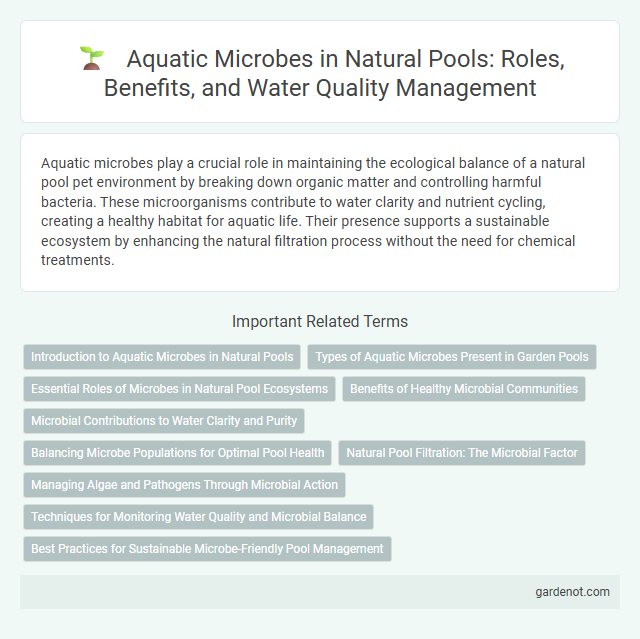Aquatic microbes play a crucial role in maintaining the ecological balance of a natural pool pet environment by breaking down organic matter and controlling harmful bacteria. These microorganisms contribute to water clarity and nutrient cycling, creating a healthy habitat for aquatic life. Their presence supports a sustainable ecosystem by enhancing the natural filtration process without the need for chemical treatments.
Introduction to Aquatic Microbes in Natural Pools
Aquatic microbes in natural pools play a crucial role in maintaining water quality and ecosystem balance by breaking down organic matter and cycling nutrients. These microorganisms, including bacteria, algae, and protozoa, contribute to the biological filtration system, reducing harmful contaminants without the use of chemicals. Understanding the diversity and function of aquatic microbes is essential for optimizing the health and sustainability of natural swimming pools.
Types of Aquatic Microbes Present in Garden Pools
Garden pools host diverse aquatic microbes, including cyanobacteria, green algae, and diatoms, each playing a crucial role in nutrient cycling and water clarity. Beneficial bacteria such as nitrifying microbes help break down organic waste, maintaining a balanced ecosystem. Protozoa and microscopic fungi contribute to organic matter decomposition, fostering a healthy and self-sustaining natural pool environment.
Essential Roles of Microbes in Natural Pool Ecosystems
Aquatic microbes in natural pools drive critical nutrient cycling processes, breaking down organic matter and supporting plant growth by converting nitrogen and phosphorus into bioavailable forms. These microorganisms create a balanced ecosystem by controlling algae populations and preventing harmful blooms, thus maintaining water clarity and quality. Furthermore, microbes form biofilms that enhance oxygen exchange and provide habitat for beneficial invertebrates, crucial for a healthy natural pool environment.
Benefits of Healthy Microbial Communities
Healthy microbial communities in natural pools enhance water quality by breaking down organic matter and controlling harmful pathogens. These aquatic microbes support nutrient cycling, promote biodiversity, and create balanced ecosystems that reduce the need for chemical treatments. Maintaining diverse microbial populations ensures clearer water and sustainable habitat conditions for aquatic plants and animals.
Microbial Contributions to Water Clarity and Purity
Aquatic microbes play a crucial role in maintaining water clarity and purity in natural pools by breaking down organic matter and controlling nutrient levels. These microorganisms facilitate the decomposition of pollutants, preventing the buildup of algae and harmful bacteria that can cloud the water. Their metabolic activities ensure a balanced ecosystem, promoting clearer, healthier water conditions essential for sustainable natural pool environments.
Balancing Microbe Populations for Optimal Pool Health
Balancing aquatic microbe populations in natural pools is crucial for maintaining water clarity and ecosystem health. Beneficial microbes help break down organic matter, preventing algae blooms and reducing harmful pathogens. Regular monitoring and adjusting pool conditions, such as pH and nutrient levels, supports a stable microbial environment that promotes natural filtration and water quality.
Natural Pool Filtration: The Microbial Factor
Aquatic microbes play a crucial role in natural pool filtration by breaking down organic matter and maintaining water clarity through biological processes. These microorganisms, including bacteria and algae, create a balanced ecosystem that naturally reduces harmful pathogens and nutrient buildup. Effective microbial activity enhances water quality, reduces the need for chemical treatments, and supports sustainable pool maintenance.
Managing Algae and Pathogens Through Microbial Action
Aquatic microbes play a crucial role in managing algae and pathogens in natural pools by maintaining balanced microbial ecosystems that inhibit harmful blooms and promote water clarity. Beneficial bacteria break down organic matter and compete with algae and pathogens for nutrients, reducing their growth and preventing water quality deterioration. Employing microbial action as a natural filtration method supports a sustainable, chemical-free approach to water purification in eco-friendly pool designs.
Techniques for Monitoring Water Quality and Microbial Balance
Techniques for monitoring water quality and microbial balance in natural pools include regular sampling and analysis of water using advanced microscopy and DNA sequencing to identify and quantify aquatic microbes. Employing biosensors and real-time monitoring systems enables early detection of harmful microbial blooms, maintaining ecological equilibrium. Implementing these methods ensures optimal conditions for beneficial microbial communities, supporting natural filtration and overall pool health.
Best Practices for Sustainable Microbe-Friendly Pool Management
Maintaining a natural pool with a thriving aquatic microbe ecosystem requires minimizing chemical use and promoting biodiversity through native plant integration. Regularly monitoring water parameters such as pH, dissolved oxygen, and nutrient levels ensures optimal conditions for microbial growth and prevents harmful algal blooms. Employing biofiltration systems and organic matter removal enhances water clarity while supporting the natural microbial balance essential for sustainable pool management.
Aquatic microbe Infographic

 gardenot.com
gardenot.com